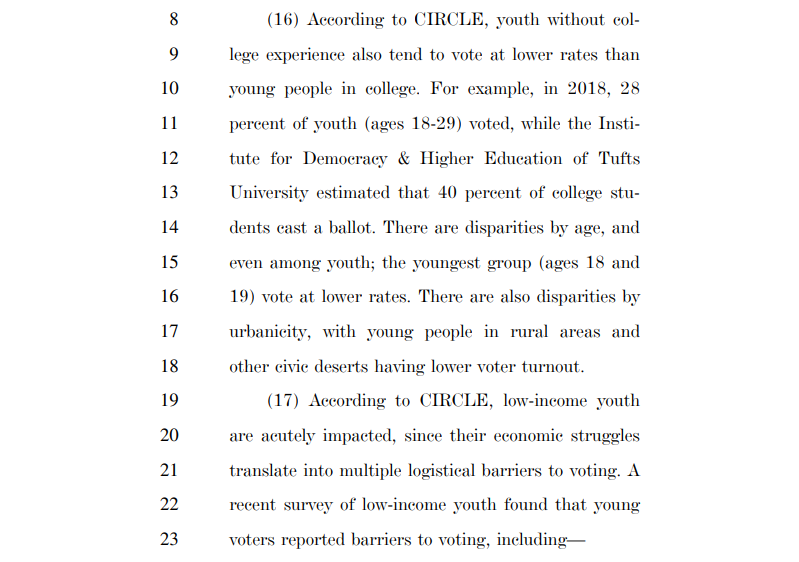Impact and Accomplishments
CIRCLE advances productive connections between research, policy, and practice, and we measure the effectiveness of our work by its impact on the conditions that shape youth civic education and engagement. That impact often occurs, not solely because of our research, but thanks to the tireless efforts of organizations that leverage our work to advocate for new policies, engage young people in their communities, and otherwise strengthen youth engagement in America. We are proud of our role within this ecosystem of individuals and organizations, and we share these accomplishments as evidence of what can be achieved through rigorous research, thoughtful advocacy, and focused collaboration.
Since its founding, CIRCLE has been at the forefront of efforts for increased, comprehensive, and more equitable civic education in America. In 2003, we co-authored the foundational The Civic Mission of Schools report, which launched influential efforts to create new civic education laws, standards, and programs. In 2010, we served as co-founding member of the National Action Civics Collaborative, and then-CIRCLE director Peter Levine chaired the civics writing team of the C3 Framework for Social Studies State Standards published in 2013. That year, the report of our Commission on Youth Voting and Civic Knowledge offered updated recommendations for civic education and served as impetus for the creation of the Teaching for Democracy Alliance, which is led by CIRCLE.
In recent years, we have played a role in efforts to create, reform, and/or evaluate the implementation and effectiveness of statewide civics requirements in Illinois, Florida, and Massachusetts. In 2017, recognizing that much remains to be done, CIRCLE Director Kei Kawashima-Ginsberg and Levine authored and presented The Republic is (Still) at Risk–and Civics is Part of the Solution for the Democracy At a Crossroads National Summit. In 2018, Kawashima-Ginsberg testified about the importance of civic education at a hearing of the National Commission on Military, National, and Public Service. In 2019, she worked closely with the producers of the children's educational television show Arthur to incorporate civic themes and content into the program.
In 2019-2020, Kawashima-Ginsberg and Levine served as principal investigators in the Educating for American Democracy initiative, a groundbreaking effort that involved more than 300 educations in creating a roadmap to transform K-12 civics and history education in the United States. You can watch the EAD Roadmap national forum, featuring our director, below.
CIRCLE's research on youth electoral participation, especially on differences in voter turnout and on the barriers to voting faced by youth, has been a key resource for policymakers. In 2022, Sen. Elizabeth Warren and Rep. Nikema Williams introduced the Youth Voting Rights Act, they explicitly cited our work to make the case for their landmark bill.

CIRCLE's research and advocacy has informed to help advance other proposals for electoral reforms. Guided in part by our longstanding recommendation to lower the voting age in local elections, cities like Takoma Park, Maryland, and Berkeley, California, have done just that—with some promising early results. Other major jurisdictions, including San Francisco and the District of Columbia, have considered similar measures, and Rep. Ayanna Pressley introduced an amendment in the U.S. House of Representatives the to lower the voting age to 16 federal elections. We have contributed to the fight against restrictive election laws: in 2016, CIRCLE leaders provided expert testimony in a federal lawsuit that ultimately struck down such a law in North Carolina.
CIRCLE is also one of the nation's must trusted sources of data and analysis on youth voting, and a key resource for journalists who are writing about young people's impact on democracy. Each year, our work is cited in hundreds of articles; during election cycles in particular, we play a leading role in shaping the public conversation about youth political participation. The tenor of that conversation is crucial: just as media can perpetuate the notion that youth are apathetic, it can highlight youth engagement and foster a culture in which their participation is valued, expected, and influential. The media can also help dispel myths or change focus: for example, too many people equate "youth voting" with "voting by college students". We have helped shift attention to the needs of young people who aren't in college and others who feel disconnected from civic life.
The recent election cycles have been a prime example of CIRCLE's impact, as our work helped both drive and document increases in youth voter turnout. In 2018, our data reinforced the importance of young activists, especially after the Parkland school shooting, and how that activism could translate into participation at the ballot box. In 2020, we highlighted how young people's political efficacy had only grown; we also focused on identifying and addressing challenges to youth electoral participation during a pandemic. In both 2018 and 2020, our data revealed a major rise in youth voting compared to the previous midterm and presidential elections, respectively.
Our work with partners is crucial to our impact, and since our founding we have supported numerous organizations to advance shared goals of improving youth engagement. CIRCLE has answered research queries, provided tailored data, attended meetings, reviewed materials, and/or served on the advisory/governing boards of 240 organizations, including 40 higher education institutions and 15 foundations. CIRCLE leaders currently serve on the boards or advisory groups of: Nonprofit VOTE, Generation Citizen, Rock the Vote's Democracy Class, the American Library Association, and DoSomething.org.
One of the key ways we have contributed to the field is by conducting rigorous formal evaluations of programs and initiatives focused on civic education and engagement. This research has helped these organizations deepen learning and practice, strategically deploy their resources, and make the case to funders and policymakers for the importance of civic engagement and of their own work. They include, among others: iCivics, Nonprofit VOTE, Democracy Works, Generation Citizen, YouthBuild, the McCormick Foundation, the American Bar Association, the Lou Frey Institute, the Close Up Foundation, the Online News Association, Project Information Literacy (youth and news media), and the VOTER study.

